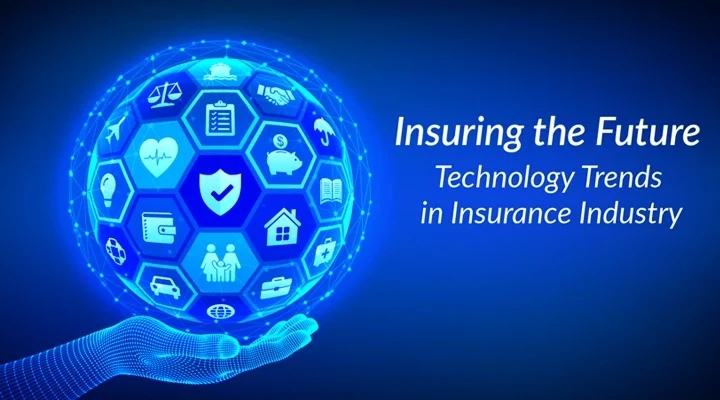The Impact of Technology on the Insurance Industry in 2025, The insurance industry is one of the oldest and most essential sectors in the global economy. Over time, it has adapted to various challenges, including economic fluctuations, regulatory changes, and shifts in customer behavior. However, the most significant transformation is yet to come—one driven by technology. By 2025, the integration of advanced technologies in the insurance sector will redefine operations, enhance customer experience, and streamline business processes. This article explores the impact of technology on the insurance industry in 2025, highlighting the major technological trends that will reshape the industry.
Automation and Artificial Intelligence (AI): A Revolution in Insurance Operations
In 2025, automation and artificial intelligence (AI) will be at the forefront of transforming the insurance industry. Insurers are already leveraging AI to enhance various aspects of their business, from underwriting to claims processing. As AI technology advances, its impact will be more profound, allowing insurers to provide faster, more personalized services. The Impact of Technology on the Insurance Industry in 2025.
AI-Driven Underwriting and Risk Assessment
One of the primary applications of AI in insurance is underwriting. Traditionally, underwriters manually assess risks, using a mix of historical data, personal assessments, and intuition. However, AI will enable more accurate risk evaluation by analyzing vast amounts of data, including social media activity, telematics, and IoT sensors. These data points will provide a more precise and dynamic view of the risk landscape. The Impact of Technology on the Insurance Industry in 2025.
In 2025, AI algorithms will continuously update risk profiles based on real-time data, improving underwriting decisions. This shift will lead to more accurate pricing, reducing the likelihood of fraud and ensuring that premiums are aligned with the actual risk associated with the policyholder.
Streamlining Claims Management
AI’s ability to process and analyze large volumes of data will also revolutionize claims management. In 2025, AI-powered claims systems will automate routine tasks such as claim verification, fraud detection, and settlement decisions. This will not only speed up the claims process but also reduce human error and improve customer satisfaction. The Impact of Technology on the Insurance Industry in 2025.
Moreover, AI chatbots will play a pivotal role in customer service, assisting clients in filing claims and tracking the status of their claims in real time. This will enhance transparency and significantly reduce customer frustration.
Blockchain: Enhancing Transparency and Security
Another technology set to have a significant impact on the insurance industry by 2025 is blockchain. Blockchain technology offers decentralized, immutable ledgers that can improve transparency, security, and efficiency in various insurance processes. The Impact of Technology on the Insurance Industry in 2025.
Fraud Prevention
Fraud is a pervasive issue in the insurance industry, leading to billions of dollars in losses every year. Blockchain will help insurers reduce fraudulent activities by providing a secure and transparent record of all transactions. With blockchain, every step in the insurance lifecycle—policy creation, claims submission, and payment processing—will be recorded on an immutable ledger. This will make it much harder for fraudsters to manipulate data and file false claims.
Smart Contracts
By 2025, the use of smart contracts—self-executing contracts with the terms directly written into code—will become commonplace in the insurance industry. Smart contracts will automate policy issuance and claims settlement, reducing administrative costs and eliminating the need for intermediaries. This will result in faster payouts and a more efficient claims process for policyholders.
Internet of Things (IoT): Real-Time Data for Smarter Insurance
The Internet of Things (IoT) is a network of interconnected devices that communicate with each other and share data. By 2025, the IoT will play an increasingly important role in the insurance industry by providing real-time data that helps insurers assess risk more accurately and offer personalized policies.
Telematics for Usage-Based Insurance
In the auto insurance sector, telematics will be widely used for usage-based insurance (UBI) models. Through IoT devices installed in vehicles, insurers will collect data on driving behavior, including speed, distance traveled, and even how aggressively a person drives. This data will allow insurers to offer personalized premiums based on individual driving patterns rather than generic demographic factors. By 2025, the majority of auto insurance policies are expected to be priced using telematics-based data.
Smart Homes and Property Insurance
The IoT will also impact property insurance. Smart home devices such as smoke detectors, security cameras, and water leak sensors will provide real-time data on potential risks. Insurers will use this data to offer dynamic pricing and provide policyholders with recommendations to reduce risks, such as installing additional sensors or upgrading their security systems. The use of IoT in property insurance will result in better risk management and potentially lower premiums for customers who take proactive measures to protect their homes.
Digital Platforms and Customer-Centric Insurance Models
In 2025, digital transformation will continue to shift the insurance industry’s focus towards customer-centricity. Traditional, paper-based processes are being replaced by digital platforms that provide seamless experiences for customers at every stage of their journey.
Seamless Online Purchasing
One of the most noticeable changes will be the ease with which customers can purchase insurance. Gone are the days of lengthy paperwork and face-to-face meetings with agents. By 2025, digital insurance platforms will offer instant quotes, customized policy options, and automated approval processes, all from the comfort of a customer’s home. The insurance purchase journey will be fast, transparent, and entirely digital.
Personalized Customer Experiences
With the integration of big data analytics and AI, insurance companies will be able to deliver hyper-personalized customer experiences. Insurers will analyze customer behavior, preferences, and needs to offer tailored products and services. In 2025, customers will expect insurers to provide proactive solutions that anticipate their needs, rather than just reacting to claims.
Moreover, mobile apps will become the central hub for managing policies, making claims, and accessing customer support. These apps will be powered by AI, providing instant responses to inquiries and offering personalized recommendations based on user behavior and historical data.
Cybersecurity: Protecting Customer Data in an Increasingly Digital World
As the insurance industry becomes more digitized, ensuring the security of customer data will be paramount. By 2025, cybersecurity will be a top priority for insurance companies, especially as they handle sensitive personal and financial information.
Advanced Security Technologies
Insurers will implement advanced security technologies such as biometrics, multi-factor authentication (MFA), and end-to-end encryption to safeguard customer data. AI and machine learning will also play a key role in detecting and preventing potential cyber threats by identifying patterns and anomalies in real-time.
Regulatory Compliance
With increasing regulations around data privacy, including the General Data Protection Regulation (GDPR) in Europe and similar laws globally, insurers will need to ensure they are fully compliant. In 2025, technology will help insurers navigate complex regulatory environments, automate compliance processes, and ensure that customer data is handled with the highest level of security and privacy.
Conclusion: A Transformative Future for the Insurance Industry
The impact of technology on the insurance industry in 2025 will be profound, as advancements in AI, blockchain, IoT, and digital platforms reshape the way insurers operate and interact with customers. From automated underwriting to smart contracts and usage-based insurance, technology will provide insurers with new tools to enhance operational efficiency, reduce costs, and improve the overall customer experience.
As technology continues to evolve, insurers must embrace these changes to remain competitive in an increasingly digital world. By doing so, they will not only improve their bottom line but also better serve the evolving needs of their customers in the years to come.



